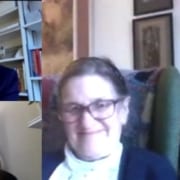The Book of Centuries: Reflections for the New Year
The celebration of a new year gives us an opportunity to mark another milestone in the timeline of history 𐆑 another 365 days completed. Charlotte Mason believed that the chronology of history formed the framework for much of a child’s education. She wrote, ‘It is a great thing to possess a pageant of history in the background of one’s thoughts…The present becomes enriched for us with the wealth of all that has gone before.’
To help children understand this chronology, early Charlotte Mason educators used a ‘Book of Centuries’ 𐆑 essentially a timeline in a book in which each two-page spread covered one hundred years. One described it in this way: ‘Every child’s “Book of Centuries” should bear witness to “a liberal and generous diet of History.” The children should be free to enter on their pages events and drawings which have interested them in their wide general reading ….As time goes on the pages become fuller, and fascinating historical facts are discovered which shed light on contemporary and consecutive history in each century.’
Heritage pupils learn history in keeping with the same principles; through narration, in chronological order. They also keep a Book of Centuries 𐆑 for Juniors, a small binder divided into the Ancient World, The Middle Ages and The Modern World 𐆑 to be filled by the pupil over time with written narrations, maps, and pictures. (Years 7 and 8 also keep a more traditional Book of Centuries as part of the Enrichment Programme.) Entries include authors, composers, scientists and artists as well as historical figures. All elements of learning therefore hang together with the timeline, allowing them to make their own connections and providing a visual ‘peg’ to hang their knowledge of history on. Pupils begin to see for themselves the progression of human society, and history becomes a captivating story to remember for a lifetime rather than dry, disconnected names and dates to memorize for an exam.
Again, Charlotte Mason: ‘Let a child have the meat he requires in his history readings, and in the literature which naturally gathers around this history, and imagination will bestir itself without any help of ours; the child will live out in detail a thousand scenes of which he only gets the merest hint.’






